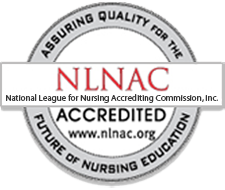To determine if an educational program meets the professional standard, an evaluation process is done by an outside body. This evaluation process is called an accreditation. Most schools or programs seek accreditation because it tells of the competence of the school or the program. One of the national organizations that has an accreditation entity is the National League for Nursing (NLN).
The NLN is a membership organization for nursing faculty and leaders in education. Part of it is the National League for Nursing Accrediting Commission (NLNAC) which is the entity that is responsible for the accreditation of nursing education schools and programs. The NLNAC website has a detailed information on a wide variety of nursing programs that has specialized accreditation the NLNAC is responsible for, including clinical doctorate, master’s, bachelor’s, associate’s, diploma, and practical programs.
The NLNAC accreditation serves to provide assurance that schools and nursing programs meet or exceed certain standards and criteria. Nursing schools or programs that have an NLNAC accreditation are able to improve through self-evaluation. The accreditation also helps programs recruit students, assures employers that graduates have competent skills, guide students in their job and education choices, and helps students be eligible for financial assistance from government sources.
Not all schools or programs in nursing have an NLN accreditation. So students who choose to attend non-accredited programs may not be eligible for financial aid. Non-accredited programs may not be transferred as well when students decide to change programs or further education. And the worst, students may have fewer job possibilities if they attend non-accredited programs, especially in the government.
The NLN accreditation done by the NLNAC is an important factor in considering a nursing school or program. Aside from it serving as proof that a program is following professional standard, an accreditation also has benefits that students attending the program can take advantage.
